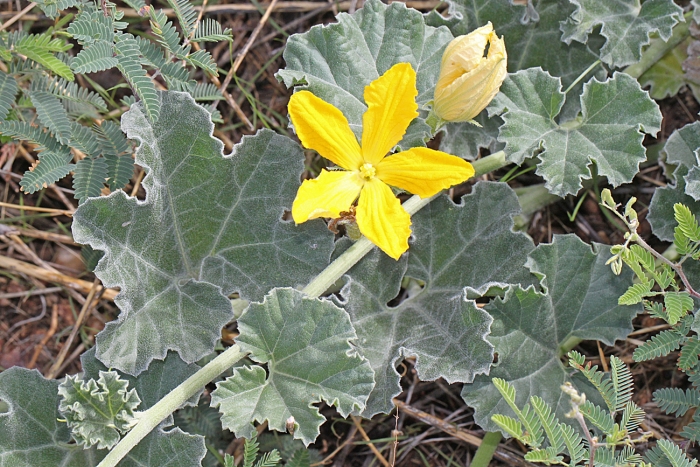Melon Loco
(Apodanthera undulata)
Melon Loco (Apodanthera undulata)
/
/

ALAN SCHMIERER
CC0
Image By:
ALAN SCHMIERER
Recorded By:
Copyright:
CC0
Copyright Notice:
Photo by: ALAN SCHMIERER | License Type: CC0 | License URL: http://creativecommons.org/publicdomain/zero/1.0/deed.en | Uploader: Fæ | Publisher: Wikimedia Commons | Title: MELON-LOCO_(Apodanthera_undulata)_78_circulo_montana,_patagonia_lake_ranch_estates,_scc,_az_-01_(5988170756).jpg | Notes: {{Information |Description={{en|1=''Arachis hypogaea'', Fabaceae, Peanut, Groundnut, growing fruit stalk; Botanical Garden KIT, Karlsruhe, Germany. The dried fruits are used in homeo












































Estimated Native Range
Summary
Apodanthera undulata, commonly known as Melon Loco, is a deciduous perennial vine or herb native to arid and semi-arid regions, including desert washes, grasslands, and scrub areas of the Southwestern United States and Mexico. It is a monoecious plant with a massive taproot that can reach up to 20 cm (8 inches) in diameter. The stems are prostrate, running along the ground for up to 2.4 m (8 feet), and sometimes climbing with tendrils. The leaves are round to kidney-shaped, up to 15 cm (6 inches) across, with a wavy margin. The yellow, trumpet-shaped flowers bloom in the warmer months and are followed by distinctive egg-shaped fruits with lengthwise ridges, measuring up to 10 cm (4 inches) long.
Melon Loco is valued for its drought tolerance and unique appearance, making it suitable for xeriscaping and as an ornamental in arid climate gardens. It thrives in full sun and requires minimal water once established, preferring well-drained soils. While it can be an interesting conversation piece due to its unusual fruit, the plant is not widely cultivated and may be difficult to find in nurseries. Gardeners should be aware that the fruit is inedible and considered toxic. Additionally, the vine’s foul smell when crushed or cut can be off-putting.CC BY-SA 4.0
Melon Loco is valued for its drought tolerance and unique appearance, making it suitable for xeriscaping and as an ornamental in arid climate gardens. It thrives in full sun and requires minimal water once established, preferring well-drained soils. While it can be an interesting conversation piece due to its unusual fruit, the plant is not widely cultivated and may be difficult to find in nurseries. Gardeners should be aware that the fruit is inedible and considered toxic. Additionally, the vine’s foul smell when crushed or cut can be off-putting.CC BY-SA 4.0
Plant Description
- Plant Type: Vine
- Height: 4-10 feet
- Width: 4-7 feet
- Growth Rate: Moderate
- Flower Color: Yellow
- Flowering Season: Spring, Fall
- Leaf Retention: Deciduous
Growth Requirements
- Sun: Full Sun
- Water: Low
- Drainage: Medium, Fast
Common Uses
Edible*Disclaimer: Easyscape's listed plant edibility is for informational use. Always verify the safety and proper identification of any plant before consumption., Low Maintenance
Natural Habitat
Native to arid and semi-arid regions, including desert washes, grasslands, and scrub areas in the Southwestern United States and Mexico
Other Names
Common Names:
Scientific Names: , Apodanthera undulata, Apodanthera undulata var. undulata,
GBIF Accepted Name: Apodanthera undulata A.Gray